According to research (entitled “Increasing Affluent, Educated, and Diverse African-American Consumers: The Untold Story“) conducted by Nielsen, Black immigrants in the United States are earning more income than U.S.-born Blacks.
SEE ALSO: James Bond of Ghanaian Journalism Debuts ‘Ghana in the Eyes of God’ Targeting Judges Who Take Bribe
Since 1980, the Black immigrant population in the United States has more than doubled to an unprecedented 3.8 million.
Leading the population growth are Jamaicans at 18 percent, Haitians at 15 percent, Nigerians at 6 percent, Trinidadians at 5 percent, and Ethiopians also at 5 percent.
See the full Black immigrant breakdown in the Unites States below:
Of the total number of Black immigrants, 36 percent are Africans.
Through its research, Nielsen says that the median household income for Black immigrants comes in at 30 percent higher than African Americans.
Nielsen Senior Vice President of Global Communications Andrew McCaskill explains, “A lot of the African…immigrants are coming specifically to get an education in the States.
“High numbers are college-educated and not only have college degrees, but also Master’s.”
According to McCaskill, Black immigrants’ penchant for entrepreneurship has been one of the pillars of not only building wealth but also keeping that wealth within their respective communities.
“They’re creating jobs in their communities. They are buying products from their entrepreneurs. There typically is a culture of recycling dollars, which contributes greatly to the rising fortunes.”
On the other hand, with African Americans suffering from centuries of institutional racism, discrimination, and violence — with economic powerhouses such as Black Wall Street (a.k.a. Little Africa) being targeted and destroyed during the race riots of 1921 in Tulsa, Oklahoma — African Americans’ entrepreneurial spirit has been dampened over the years.
Still, McCaskill said that he hopes the African-American business community experiences a resurgence, “When Black consumers see how much power they have, it will change the way African Americans look at themselves and see how much power they have become economically.
“They have the power to drive the products and services that come in to their lives and come in to their communities,” McCaskill says.
SEE ALSO: The Somo Project Launch Crowdfunding Campaign Through UC Berkeley











